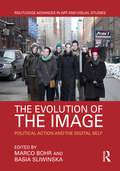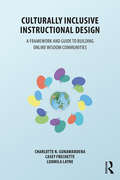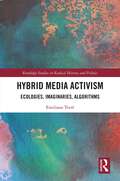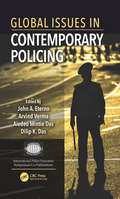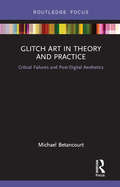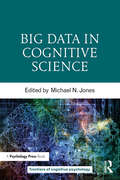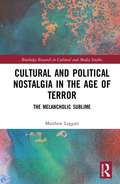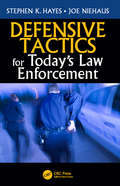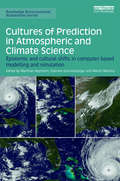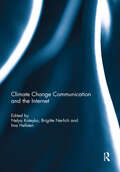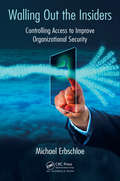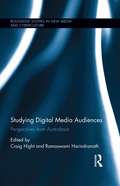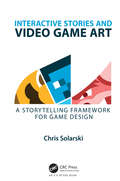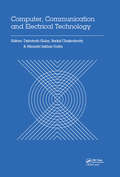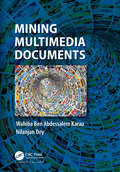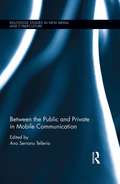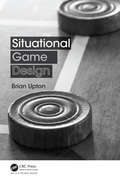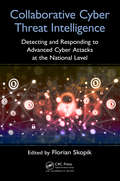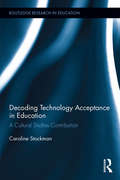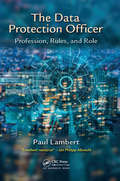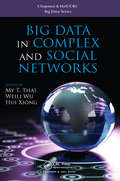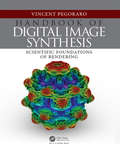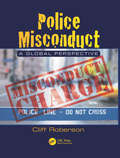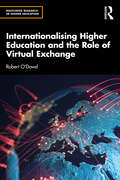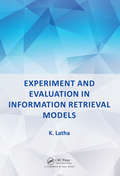- Table View
- List View
The Evolution of the Image: Political Action and the Digital Self (Routledge Advances in Art and Visual Studies)
by Marco Bohr Basia SliwinskaThis volume addresses the evolution of the visual in digital communities, offering a multidisciplinary discussion of the ways in which images are circulated in digital communities, the meanings that are attached to them and the implications they have for notions of identity, memory, gender, cultural belonging and political action. Contributors focus on the political efficacy of the image in digital communities, as well as the representation of the digital self in order to offer a fresh perspective on the role of digital images in the creation and promotion of new forms of resistance, agency and identity within visual cultures.
Culturally Inclusive Instructional Design: A Framework and Guide to Building Online Wisdom Communities
by Charlotte Gunawardena Casey Frechette Ludmila LayneWINNER OF THE 2019 OUTSTANDING BOOK AWARD FROM AECT'S DIVISION OF DISTANCE EDUCATION! As online courses and digital learning enable more people from more places to learn together, it is crucial for instructional design to incorporate diverse cultural perspectives. Culturally Inclusive Instructional Design provides a framework for thinking about culture in digital learning, offering insight into how to build inclusive online communities that encourage reflection and growth, regardless of content domain. Chapters cover the foundation, components, and implementation of the authors’ Wisdom Communities (WisCom) framework, which enables learners from global backgrounds to experience long-lasting, transformative learning through real-world problem-solving. This book is a timely, resourceful guide to building truly collaborative, inquiry-based online learning experiences.
Hybrid Media Activism: Ecologies, Imaginaries, Algorithms (Routledge Studies in Radical History and Politics)
by Emiliano TreréThis book is an extensive investigation of the complexities, ambiguities and shortcomings of contemporary digital activism. The author deconstructs the reductionism of the literature on social movements and communication, proposing a new conceptual vocabulary based on practices, ecologies, imaginaries and algorithms to account for the communicative complexity of protest movements. Drawing on extensive fieldwork on social movements, collectives and political parties in Spain, Italy and Mexico, this book disentangles the hybrid nature of contemporary activism. It shows how activists operate merging the physical and the digital, the human and the non-human, the old and the new, the internal and the external, the corporate and the alternative. The author illustrates the ambivalent character of contemporary digital activism, demonstrating that media imaginaries can be either used to conceal authoritarianism, or to reimagine democracy. The book looks at both side of algorithmic power, shedding light on strategies of repression and propaganda, and scrutinizing manifestations of algorithms as appropriation and resistance. The author analyses the way in which digital activism is not an immediate solution to intricate political problems, and argues that it can only be effective when a set of favourable social, political, and cultural conditions align. Assessing whether digital activism can generate and sustain long-term processes of social and political change, this book will be of interest to students and scholars researching radical politics, social movements, digital activism, political participation and current affairs more generally.
Global Issues in Contemporary Policing (International Police Executive Symposium Co-Publications)
by John A. Eterno Arvind Verma Aiedeo Mintie Das Dilip K. DasThis book addresses six areas of policing: performance management, professional and academic partnerships, preventing and fighting crime and terrorism, immigrant and multicultural populations, policing the police, and cyber-security. The book contains the most current and ground-breaking research across the world of policing with contributors from over 20 countries. It is also a suitable reference or textbook in a special topics course. It consists of edited versions of the best papers presented at the IPES annual meeting in Budapest.
Glitch Art in Theory and Practice: Critical Failures and Post-Digital Aesthetics
by Michael BetancourtGlitch Art in Theory and Practice: Critical Failures and Post-Digital Aesthetics explores the concept of "glitch" alongside contemporary digital political economy to develop a general theory of critical media using glitch as a case study and model, focusing specifically on examples of digital art and aesthetics. While prior literature on glitch practice in visual arts has been divided between historical discussions and social-political analyses, this work provides a rigorous, contemporary theoretical foundation and framework.
Big Data in Cognitive Science (Frontiers of Cognitive Psychology)
by Michael N. JonesWhile laboratory research is the backbone of collecting experimental data in cognitive science, a rapidly increasing amount of research is now capitalizing on large-scale and real-world digital data. Each piece of data is a trace of human behavior and offers us a potential clue to understanding basic cognitive principles. However, we have to be able to put the pieces together in a reasonable way, which necessitates both advances in our theoretical models and development of new methodological techniques. The primary goal of this volume is to present cutting-edge examples of mining large-scale and naturalistic data to discover important principles of cognition and evaluate theories that would not be possible without such a scale. This book also has a mission to stimulate cognitive scientists to consider new ways to harness big data in order to enhance our understanding of fundamental cognitive processes. Finally, this book aims to warn of the potential pitfalls of using, or being over-reliant on, big data and to show how big data can work alongside traditional, rigorously gathered experimental data rather than simply supersede it. In sum, this groundbreaking volume presents cognitive scientists and those in related fields with an exciting, detailed, stimulating, and realistic introduction to big data – and to show how it may greatly advance our understanding of the principles of human memory, perception, categorization, decision-making, language, problem-solving, and representation.
Cultural and Political Nostalgia in the Age of Terror: The Melancholic Sublime (Routledge Research in Cultural and Media Studies)
by Matthew LeggattThis book re-examines the role of the sublime across a range of disparate cultural texts, from architecture and art, to literature, digital technology, and film, detailing a worrying trend towards nostalgia and arguing that, although the sublime has the potential to be the most powerful uniting aesthetic force, it currently spreads fear, violence, and retrospection. In exploring contemporary culture, this book touches on the role of architecture to provoke feelings of sublimity, the role of art in the aftermath of destructive events, literature’s establishment of the historical moment as a point of sublime transformation and change, and the place of nostalgia and the returning of past practices in digital culture from gaming to popular cinema.
Defensive Tactics for Today’s Law Enforcement
by Stephen K. Hayes Joe NiehausFew of the many defensive tactics books on the market include the training and methods of martial arts. Drawing on the centuries-old techniques of Ninjutsu, Defensive Tactics for Today’s Law Enforcement offers alternatives to the traditional police defensive tactics taught to most officers. This text stresses relying on natural tendencies in a violent encounter to ensure officer safety and to better utilize the techniques and training officers do receive. By integrating existing training with martial arts expertise, Defensive Tactics provides officers access a full complement of techniques to better navigate physical conflict safely and effectively. Intended for law enforcement practitioners, as well as practitioners of any other professions that present a personal security risk, Defensive Tactics for Today’s Law Enforcement will better equip readers with a diverse range of defensive tactics.
Cultures of Prediction in Atmospheric and Climate Science: Epistemic and Cultural Shifts in Computer-based Modelling and Simulation (Routledge Environmental Humanities)
by Matthias Heymann Gabriele Gramelsberger Martin MahonyIn recent decades, science has experienced a revolutionary shift. The development and extensive application of computer modelling and simulation has transformed the knowledge‐making practices of scientific fields as diverse as astro‐physics, genetics, robotics and demography. This epistemic transformation has brought with it a simultaneous heightening of political relevance and a renewal of international policy agendas, raising crucial questions about the nature and application of simulation knowledges throughout public policy. Through a diverse range of case studies, spanning over a century of theoretical and practical developments in the atmospheric and environmental sciences, this book argues that computer modelling and simulation have substantially changed scientific and cultural practices and shaped the emergence of novel ‘cultures of prediction’. Making an innovative, interdisciplinary contribution to understanding the impact of computer modelling on research practice, institutional configurations and broader cultures, this volume will be essential reading for anyone interested in the past, present and future of climate change and the environmental sciences.
Climate Change Communication and the Internet
by Nelya Koteyko, Brigitte Nerlich and Iina HellstenThe volume provides a timely, state of the art collection of studies examining climate change communication in the era of digital media. The chapters focus on a broad range of topics covering various aspects of both practice and research in climate change communication, ranging from the use of online platforms, to blogs, and social networking sites. Climate change communication has increasingly moved into Internet-based forums, and this volume provides a comprehensive overview of research into Internet and climate change communication. The studies share valuable methodological insights in this relatively new field of research and shed light on the opportunities and challenges underlying the collection and analysis of online climate change-related data. This book was previously published as a special issue of Environmental Communication.
Walling Out the Insiders: Controlling Access to Improve Organizational Security
by Michael ErbschloeInsider threats are everywhere. To address them in a reasonable manner that does not disrupt the entire organization or create an atmosphere of paranoia requires dedication and attention over a long-term. Organizations can become a more secure, but to stay that way it is necessary to develop an organization culture where security concerns are inherent in all aspects of organization development and management. While there is not a single one-size-fits-all security program that will suddenly make your organization more secure, this book provides security professionals and non-security managers with an approach to protecting their organizations from insider threats.
Studying Digital Media Audiences: Perspectives from Australasia (Routledge Studies in New Media and Cyberculture)
by Craig Hight Ramaswami HarindranathAlthough many digital platforms continue to appropriate and reconfigure familiar forms of media experience, this is an environment which no longer consistently constructs an identifiable 'mass' audience in the terms understood by twentieth century audience researchers. The notion of 'audiencing' takes on different characteristics within a digital environment where platforms encourage users to upload, share and respond to content, while the platforms themselves monetise the digital traces of this activity. This environment demands new ways of thinking about audience and user engagement with media technologies, and raises significant questions on methods of conceiving and researching audience-users. This volume addresses ongoing debates in the field of audience research by exploring relevant conceptual and methodological issues concerning the systematic study of digital audiences. Drawing from work conducted by researchers based in Australia and New Zealand, the book uses theoretical frameworks and case study material which are of direct relevance to audience researchers globally.
Interactive Stories and Video Game Art: A Storytelling Framework for Game Design
by Chris SolarskiThe success of storytelling in games depends on the entire development team—game designers, artists, writers, programmers and musicians, etc.—working harmoniously together towards a singular artistic vision. Interactive Stories and Video Game Art is first to define a common design language for understanding and orchestrating interactive masterpieces using techniques inherited from the rich history of art and craftsmanship that games build upon. Case studies of hit games like The Last of Us, Journey, and Minecraft illustrate the vital components needed to create emotionally-complex stories that are mindful of gaming’s principal relationship between player actions and video game aesthetics. This book is for developers of video games and virtual reality, filmmakers, gamification and transmedia experts, and everybody else interested in experiencing resonant and meaningful interactive stories. Key Features: The first book to define a common visual and interactive language for understanding and orchestrating sophisticated stories in video games Accessible to industry professionals as well as non-developers Featured concepts apply to all media with an interactive component including: transmedia, gamification and interactive art The definitive framework for designing interactive stories
Computer, Communication and Electrical Technology: Proceedings of the International Conference on Advancement of Computer Communication and Electrical Technology (ACCET 2016), West Bengal, India, 21-22 October 2016
by Debatosh Guha; Badal Chakraborty; Himadri Sekhar DuttaThe First International Conference on Advancement of Computer, Communication and Electrical Technology focuses on key technologies and recent progress in computer vision, information technology applications, VLSI, signal processing, power electronics & drives, and application of sensors & transducers, etc. Topics in this conference include: Computer ScienceThis conference encompassed relevant topics in computer science such as computer vision & intelligent system, networking theory, and application of information technology. Communication EngineeringTo enhance the theory & technology of communication engineering, ACCET 2016 highlighted the state-of the-art research work in the field of VLSI, optical communication, and signal processing of various data formatting. Research work in the field of microwave engineering, cognitive radio and networks are also included. Electrical TechnologyThe state-of-the-art research topic in the field of electrical & instrumentation engineering is included in this conference such as power system stability & protection, non-conventional energy resources, electrical drives, and biomedical engineering. Research work in the area of optimization and application in control, measurement & instrumentation are included as well.
Mining Multimedia Documents
by Wahiba Ben Karaa Nilanjan DeyThe information age has led to an explosion in the amount of information available to the individual and the means by which it is accessed, stored, viewed, and transferred. In particular, the growth of the internet has led to the creation of huge repositories of multimedia documents in a diverse range of scientific and professional fields, as well as the tools to extract useful knowledge from them. <P><P>Mining Multimedia Documents is a must-read for researchers, practitioners, and students working at the intersection of data mining and multimedia applications. It investigates various techniques related to mining multimedia documents based on text, image, and video features. It provides an insight into the open research problems benefitting advanced undergraduates, graduate students, researchers, scientists and practitioners in the fields of medicine, biology, production, education, government, national security and economics.
Between the Public and Private in Mobile Communication (Routledge Studies in New Media and Cyberculture)
by Ana Serrano TelleríaMobile devices’ impact on daily life has raised relevant questions regarding public and private space and communication. Both the technological environment (operating systems, platforms, apps) and media ecosystems (interface design, participatory culture, social media) influence how users deal with the public and private, intimate and personal spheres. Leading researchers in communication, art, computer engineering, education, law, sociology, philosophy, and psychology here explore current methodologies for studying the dichotomy of the public and private in mobile communication, providing a foundation for further research.
Situational Game Design
by Brian UptonSituational Design lays out a new methodology for designing and critiquing videogames. While most game design books focus on games as formal systems, Situational Design concentrates squarely on player experience. It looks at how playfulness is not a property of a game considered in isolation, but rather the result of the intersection of a game with an appropriate player. Starting from simple concepts, the book advances step-by-step to build up a set of practical tools for designing player-centric playful situations. While these tools provide a fresh perspective on familiar design challenges as well as those overlooked by more transactional design paradigms. Key Features Introduces a new methodology of game design that concentrates on moment-to-moment player experience Provides practical design heuristics for designing playful situations in all types of games Offers groundbreaking techniques for designing non-interactive play spaces Teaches designers how to create games that function as performances Provides a roadmap for the evolution of games as an art form.
Collaborative Cyber Threat Intelligence: Detecting and Responding to Advanced Cyber Attacks at the National Level
by Florian SkopikThreat intelligence is a surprisingly complex topic that goes far beyond the obvious technical challenges of collecting, modelling and sharing technical indicators. Most books in this area focus mainly on technical measures to harden a system based on threat intel data and limit their scope to single organizations only. This book provides a unique angle on the topic of national cyber threat intelligence and security information sharing. It also provides a clear view on ongoing works in research laboratories world-wide in order to address current security concerns at national level. It allows practitioners to learn about upcoming trends, researchers to share current results, and decision makers to prepare for future developments.
Decoding Technology Acceptance in Education: A Cultural Studies Contribution (Routledge Research in Education)
by Caroline StockmanThe process of integrating technology into education often overlooks that technology is a sign; it is not a neutral message conveyor, but rather a material artefact placed into a context inevitably subject to culture. In an original and novel combination, Decoding Technology Acceptance in Education brings together two academic domains not previously pursued together, yet which diverge in many ways: cultural studies and technology acceptance studies. Drawing on empirical data, Stockman demonstrates that teachers activate a meaning-making process through encoding and decoding signs around technology as an artefact of culture, and as a result their acceptance behaviour and decisions rely on the dynamics of the cultural whole to which they belong. In this study, technology acceptance is revisited as an issue of cultural negotiation; the common approach, which provides an instrumental view on technology as a neutral tool, is insufficient for the topic of technology acceptance. Rather than proposing yet another model of technology acceptance, Decoding Technology Acceptance in Education offers a renewed frame of mind and the conclusions it provides are of vital importance to the theoretical and practical advancement of technology acceptance studies, as well as to the practical integration of technology into education. Providing original empirical evidence for the influence of culture on educational decision-making, the book raises awareness for the importance of cultural research in areas where it has been under-considered. This book will be of great interest to researchers, academics and postgraduate students engaged in the study of technology acceptance and technology use in education, as well as those interested in cultural studies.
The Data Protection Officer: Profession, Rules, and Role
by Paul LambertThe EU's General Data Protection Regulation created the position of corporate Data Protection Officer (DPO), who is empowered to ensure the organization is compliant with all aspects of the new data protection regime. Organizations must now appoint and designate a DPO. The specific definitions and building blocks of the data protection regime are enhanced by the new General Data Protection Regulation and therefore the DPO will be very active in passing the message and requirements of the new data protection regime throughout the organization. This book explains the roles and responsiblies of the DPO, as well as highlights the potential cost of getting data protection wrong.
Big Data in Complex and Social Networks (Chapman & Hall/CRC Big Data Series)
by My T. Thai, Weili Wu, Hui XiongThis book presents recent developments on the theoretical, algorithmic, and application aspects of Big Data in Complex and Social Networks. The book consists of four parts, covering a wide range of topics. The first part of the book focuses on data storage and data processing. It explores how the efficient storage of data can fundamentally support intensive data access and queries, which enables sophisticated analysis. It also looks at how data processing and visualization help to communicate information clearly and efficiently. The second part of the book is devoted to the extraction of essential information and the prediction of web content. The book shows how Big Data analysis can be used to understand the interests, location, and search history of users and provide more accurate predictions of User Behavior. The latter two parts of the book cover the protection of privacy and security, and emergent applications of big data and social networks. It analyzes how to model rumor diffusion, identify misinformation from massive data, and design intervention strategies. Applications of big data and social networks in multilayer networks and multiparty systems are also covered in-depth.
Handbook of Digital Image Synthesis: Scientific Foundations of Rendering
by Vincent PegoraroThe Handbook of Digital Image Synthesis is the most up-to-date reference guide in the rapidly developing field of computer graphics. A wide range of topics, such as, applied mathematics, data structures, and optical perception and imaging help to provide a well-rounded view of the necessary formulas for computer rendering. In addition to this diverse approach, the presentation of the material is substantiated by numerous figures and computer-generated images. From basic principles to advanced theories, this book, provides the reader with a strong foundation of computer formulas and rendering through a step-by-step process. . Key Features: Provides unified coverage of the broad range of fundamental topics in rendering Gives in-depth treatment of the basic and advanced concepts in each topic Presents a step-by-step derivation of the theoretical results needed for implementation Illustrates the concepts with numerous figures and computer-generated images Illustrates the core algorithms using platform-independent pseudo-code
Police Misconduct: A Global Perspective
by Cliff RobersonThis book explores the different types of police misconduct including the use of excessive force. It also explores what types of officers become involved in illegal misconduct, steps jurisdictions may take to prevent such problems, and discusses who should police the police. Also included is a historical analysis of police misconduct, discussions on the legal restrictions designed to prevent police misconduct, and steps that the jurisdiction may take to limit their liability. Ancillary material is available with course adoption.
Internationalising Higher Education and the Role of Virtual Exchange (Routledge Research in Higher Education)
by Robert O'DowdThis volume introduces Virtual Exchange (VE) as an innovative form of online intercultural learning and investigates the myriad of ways VE is being carried out across universities, ultimately arguing for its integration into university internationalisation policies and course curricula. Against the backdrop of increased digitalisation initiatives throughout universities given the effects of the pandemic, chapters focus not only on providing new research findings, but also on providing a comprehensive introduction and argumentation for the use of VE in university education and also in demonstrating how it can be put into use by both university decision-makers and educators. Reviewing the limitations of the activity, this timely work also fundamentally posits how VE and blended mobility more broadly could be developed in future higher education initiatives. This book will be of interest to researchers, academics, scholars, and students involved with Open & Distance Education and eLearning, approaches to internationalisation in education, and the study of higher education more broadly. Those interested in innovative methods for teaching and learning, as well as educational research, will also benefit from this volume.
Experiment and Evaluation in Information Retrieval Models
by K. LathaExperiment and Evaluation in Information Retrieval Models explores different algorithms for the application of evolutionary computation to the field of information retrieval (IR). As well as examining existing approaches to resolving some of the problems in this field, results obtained by researchers are critically evaluated in order to give readers a clear view of the topic. In addition, this book covers Algorithmic Solutions to the Problems in Advanced IR Concepts, including Feature Selection for Document Ranking, web page classification and recommendation, Facet Generation for Document Retrieval, Duplication Detection and seeker satisfaction in question answering community Portals. Written with students and researchers in the field on information retrieval in mind, this book is also a useful tool for researchers in the natural and social sciences interested in the latest developments in the fast-moving subject area. Key features: Focusing on recent topics in Information Retrieval research, Experiment and Evaluation in Information Retrieval Models explores the following topics in detail: Searching in social media Using semantic annotations Ranking documents based on Facets Evaluating IR systems offline and online The role of evolutionary computation in IR Document and term clustering, Image retrieval Design of user profiles for IR Web page classification and recommendation Relevance feedback approach for Document and image retrieval
